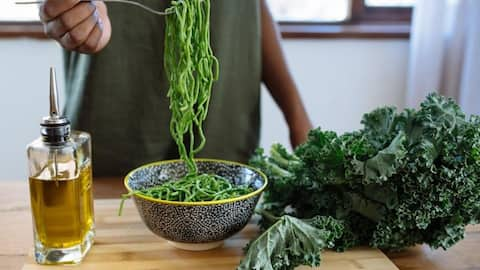Ever heard of the Atlantic Diet? Here's what it is
What's the story
The Atlantic diet, deeply rooted in the centuries-old lifestyle of northern Portugal and northwestern Spain, shares striking similarities with the Mediterranean diet. Centered around locally sourced ingredients, it emphasizes a balanced selection of key food groups, reflecting the holistic approach of its Mediterranean counterpart. Without strict rules, this diet highlights the natural abundance of nutritious foods, promoting a sustainable and nourishing way of eating.
Composition
What comprises the Atlantic diet?
Apart from seafood, the Atlantic diet comprises a diversity of fresh vegetables and fruits. From leafy greens like kale and spinach to tomatoes, peppers, and onions, the Atlantic Diet celebrates seasonal produce. These plant-based foods offer vitamins, antioxidants, and dietary fiber, contributing to overall health and well-being. Whole grains are another staple of the Atlantic Diet, in the form of bread, rice, and oats.
Ingredients
Fresh local produce
The Atlantic diet prioritizes fresh, locally obtained ingredients and advocates for cooking methods such as steaming and boiling rather than frying. It also tends to include a higher proportion of seafood and dairy products. Another hallmark of the diet is mushrooms, mirabelle plums, mussels, avocados, low-fat cheese, and tomatoes. Additionally, legumes such as beans and lentils are frequently incorporated.
Nutrition
Healthy fats play an important role
Healthy fats play a crucial role in the Atlantic Diet, primarily sourced from olive oil, nuts, and seeds. Olive oil, in particular, is a cornerstone of this dietary pattern, valued for its monounsaturated fats and antioxidant properties. Whether drizzled over salads or used for cooking, olive oil enhances both the flavor and nutritional profile of dishes in the Atlantic tradition.
Difference
Atlantic diet vs Mediterranean diet: What's the difference?
While some experts view the Atlantic diet as a variation of the Mediterranean diet, there is a notable distinction. The Atlantic diet emphasizes a range of brassicas, which is a family of vegetables including turnip greens, turnips, kale, cabbage, and cauliflower. Another important difference lies in carbohydrate sources; while the Mediterranean diet favors pasta, the Atlantic diet incorporates alternatives such as potatoes and bread.
Method
Healthy cooking
By emphasizing wholesome ingredients and traditional cooking methods like stewing, this diet enhances the body's ability to absorb and utilize nutrients effectively. Stewing, in particular, is recognized as a heart-healthy cooking technique as it preserves nutrients and flavors while minimizing the formation of harmful compounds. These toxic compounds can result from high-temperature cooking methods such as grilling and frying.
